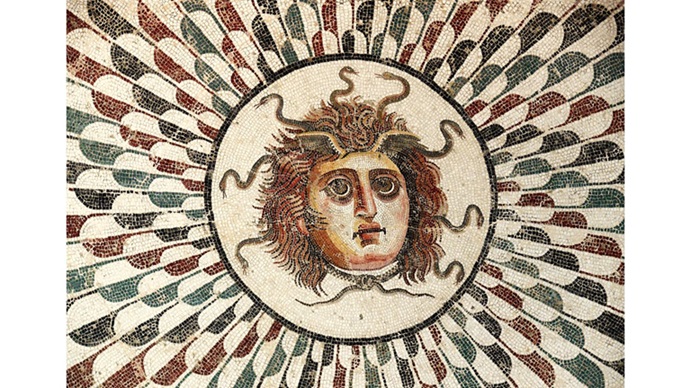.
Medusa’s Sisters
Medusa lost her head
and found renown instead.
Her living sisters roared,
“And why are we ignored
who so much fouler are
and deadlier by far?
“You’d think that she’d become
the pride of gorgondom.
Who caused Medusa’s fall?
A sniveling man—that’s all.
To that galoot the glory,
and ours a silenced story.
“By chance if one of us
had lit on Perseus,
fixed would have been his fate,
his head resting in state
upon a stony base—
as stony as his face.
“Injustice has denied
us fame. Our injured pride
we’ll soothe in sweet revenge:
we’ll make our own Stonehenge
from Perseus’ like,
each head on granite pike.
“So, you who hear our cries,
make speed to blind both eyes!
Your best hope is to find
us only in your mind.
Be warned: we shall not fail
to right this sorry tale.”
.
.
Julian D. Woodruff writes poetry and short fiction for children and adults. He recently finished 2020-2021, a poetry collection. A selection of his work can be read at Parody Poetry, Lighten Up Online, Carmina Magazine, and Reedsy.















I don’t doubt the threats of these angry sisters. ‘Gorgondom’! ‘Stonehenge!’ I’m still laughing.
Thanks for the read, Julian.
Actually, Paul, what 1st came to mind was the busts of composers decorating the exterior of the Palais Garnier in Paris. Couldn’t figure out a good rhyme, though. Thanks for reading and commenting.
These are nice trimeters — perfect for a trio of Gorgons.
Medusa was the only Gorgon who could be killed. Her two sisters were immortal, so I suppose they might be resentful if their non-divine sibling got all the publicity and glory.
And here I thought that the gorgon’s number was legion! Must be another species, I guess. Thanks for reading and commenting, Joseph.
And so the Gorgons wail with the telling of the tale.
Though Medusa lost her head, the Gorgons are not dead.
What fun to read your poem about the losing of a dome!
Thanks for a fun couplet, Roy.
Most horrible to mortals! Julian, how did you get away with such a grisly death threat of a poem? The remarkable tone sounds terribly stony.
Well, Margaret,
the SGs were among the earliest to espoused the attitude “nice girls finish last,” which to me seems stronger than ever today.
Thanks for commenting.
I’ve always been interested in Greek mythology and history, so this piece struck a chord with me. It’s rather similar in a way to Stoppard’s “Rosencrantz and Guildenstern”: we can’t help asking what happened to these two grisly characters, who vanish from literature. Thanks for a thought-provoking poem.
Thanks for an interesting comment, David. Your mention of R & G sent me off on a mini-exploration: besides Stoppard’s play (which I know only through the movie version I saw once maybe 30 years ago), I discovered there’s a play by Gilbert (sounds like fun) and movie, R &G are Undead.
You’re right–literature is full of these minor, negative characters (e.g., Aunt Norris in Mansfield Park, Tom in Gatsby) each spreading one brand of nastiness or another. Same for our history, unfortuntely.
On the subject of gorgons, there’s even been an attempt to turn Medusa into a kind of feminist avenging angel: Lorenzo Garbati’s 2008 sculpture, Medusa with the Head of Perseus, conceptually standing Cellini’s masterpiece on its head.
I live and learn; but I guess the idea of Medusa as an avenging feminist makes sense!
One fine example of extending and developing a minor character is in the Jean Rhys novel “Wide Sargasso Sea.” In this, the madwoman in “Jane Eyre” is depicted in the years before her insanity. Thanks again for an enjoyable poem.
This was both a fun and insightful read. As pointed out, you have some clever turns of phrase, and imbue the poem with the irony of being envious over another’s murder. Yet in the lilting trimeter you give us a number of lessons: most notably that fame in death is sometimes better than long life in obscurity. And I couldn’t help but detect in the gorgons’ screed a touch of rabid feminism: jealous that a man paid attention to Medusa, even if it was to kill her.
Some interesting points here, Adam. The question is raised: why shouldn’t Perseus have gone after one of Medusa’s sisters instead? Maybe Polydectes even put it to Perseus that way, and Perseus, being wise to the immortality of the sisters (per Joseph Salemi, above), answered “No way, PD. I’ll take on Medusa for the sake of honor and fame, but I’m not stupid.”
Possibly ven for monsters, undying fame (glory perverted?) is more important than having an undying body.
Thanks for commenting.